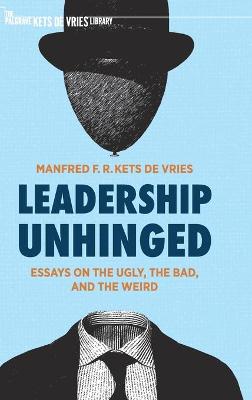The Palgrave Kets de Vries Library
3 total works
Written at a time of global pandemic, when we have been forced to confront age-old existential questions—Why are we here? Where are we going?—perhaps for the first time, Quo Vadis? is extraordinarily relevant to leaders, managers and anyone who wants to bring meaning and authenticity into their work and life. Manfred Kets de Vries argues that we need to address these fundamental and disturbing questions if we are to live fully and meaningfully. Too many people wake up on a Monday morning and do the same things they have done every Monday. They go to work and function on autopilot without questioning their purpose. But how can we make sure our lives are rich and fulfilling? How do we know we’re on the right track?
This is a book about death and the fear of death, about angst and absurdity; but it is also about endurance, honesty, well-being, responsibility, living with hard truths, creating meaning—and happiness.
Quo Vadis? makes us look full on at the things we prefer not to see. It is a short book that pulls no punches but is far from bleak. Instead, Kets de Vries shows that our life is enriched, and our ability to make meaning and find happiness is increased, when we acknowledge the inevitable price we have to pay for knowing our own mind and understanding our inevitable end.
The recent proliferation of populist movements worldwide — along with the often dangerous, demagogic leaders that accompany them — have prompted questions about the underlying conditions that give rise to such troubling developments. Leadership Unhinged: Essays on the Ugly, the Bad and the Weird examines what is going on at a deeper level, both collectively and individually, between leaders and followers. Employing theories derived from psychoanalytic psychology, developmental psychology, neuroscience and evolutionary psychology, these essays help to unravel and expose the pathological leader-follower dynamics that generate such movements.
The book is infused with Kets de Vries’s now famous and inimitable style of analysis, which draws from myths, creates fairy tales, and uses irony and metaphor to bring his conclusions into greater relief and trigger new insights. As Kets de Vries explains, effective leaders have the capacity to bring people together and even make them better, stronger. Doing so suggests that those leaders are value driven, able to set a moral tone. Yet, when such a tone is absent or, at worst, twisted toward the destructive, leadership quickly becomes dangerous. History has shown the devastation left in the wake of unhinged leaders who have gone unchecked. To become fully conscious of the conditions that allow for the emergence of such leaders has become a moral requirement of our time. In ways both moving and entertaining, Kets de Vries’s new contribution puts us in a better position to fulfil that requirement.

